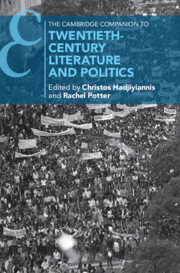Book contents
- The Cambridge Companion to Twentieth-Century Literature and Politics
- The Cambridge Companion to Twentieth-Century Literature and Politics
- Copyright page
- Contents
- Figures
- Notes on the Contributors
- Acknowledgements
- Chronology
- Introduction Literature and Politics
- Part I 1900–1945: Ideas and Governance
- Chapter 1 Liberalism
- Chapter 2 Communism
- Chapter 3 Fascism
- Chapter 4 Suffragism
- Chapter 5 Pacifism
- Part II 1945–1989: New Nations and New Frontiers
- Part III 1989–2000: Rights and Activisms
- Further Reading
- Index
- Cambridge Companions To …
Chapter 4 - Suffragism
from Part I - 1900–1945: Ideas and Governance
Published online by Cambridge University Press: 01 December 2022
- The Cambridge Companion to Twentieth-Century Literature and Politics
- The Cambridge Companion to Twentieth-Century Literature and Politics
- Copyright page
- Contents
- Figures
- Notes on the Contributors
- Acknowledgements
- Chronology
- Introduction Literature and Politics
- Part I 1900–1945: Ideas and Governance
- Chapter 1 Liberalism
- Chapter 2 Communism
- Chapter 3 Fascism
- Chapter 4 Suffragism
- Chapter 5 Pacifism
- Part II 1945–1989: New Nations and New Frontiers
- Part III 1989–2000: Rights and Activisms
- Further Reading
- Index
- Cambridge Companions To …
Summary
This chapter opens with a brief survey of suffrage literature and the scholarship it has generated before honing in on a particular example: Constance Maud’s No Surrender. This novel conforms to many characteristics of suffrage fiction, playing on romance conventions and integrating fictionalised episodes from the real-world campaign. But even as No Surrender is a campaigning novel, it is also a novel of a campaign that registers and reflects the tensions that characterised the movement. Social class was a deeply contentious issue for the campaign and is one this chapter considers with a focus on Maud’s presentation of Lancashire mill-worker, Jenny Clegg. Maud’s novel raises questions about representation, authenticity, and appropriation, questions that have troubled feminist theory and practice. This chapter suggests that a fuller familiarity with the internal debates of the campaign – particularly those between adult and woman suffragists – results in a more precise sense of how the novel works as propaganda. A corollary of such a contextual approach is that more self-reflexive and self-questioning currents in No Surrender that run parallel to its primary propagandising ones are made visible.
Keywords
- Type
- Chapter
- Information
- Publisher: Cambridge University PressPrint publication year: 2022

